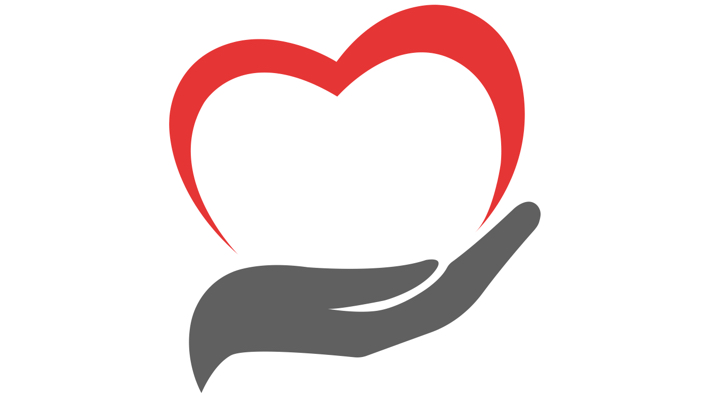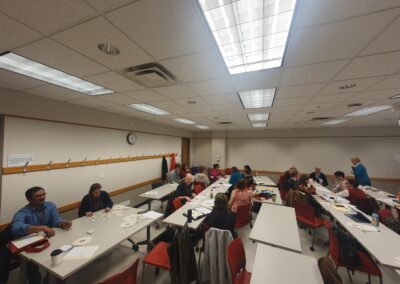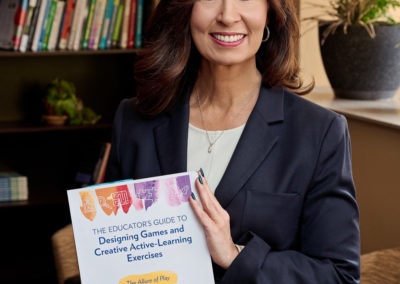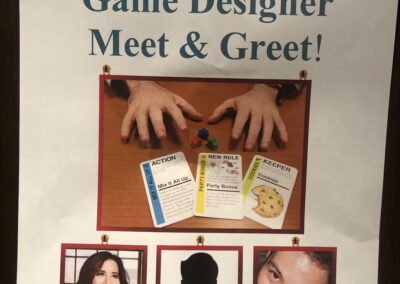I’m not a nervous person. I don’t bite my nails, or bounce my knee up and down like a jackhammer, or crack my knuckles. However, by mid-March, I was running scared. Endless Zoom meetings, countless unopened emails, emergency subcommittees—the demands were nearly overwhelming. The big challenge, of course was (and is) the emergency pivot to online instruction, but the less universal challenge—the one that enveloped me as a director of a center for teaching and learning—was (and is) the emergency pivot to online educator development needed to support faculty and graduate instructors to “keep teaching.”
“Oh, why not?” I asked myself as I accepted another Zoom invitation, this one from a group of authors I had come to know better at the last POD Network conference in Pittsburgh in November 2019. Our editor, James M. Lang, the editor of The Teaching and Learning in Higher Education book series, had attracted a goodly number of scholars to the series, and voilà, we had gelled as a community of scholarship and practice. We are an animated bunch of fellow pedagogues, and we were all in the same headspace. Nothing is normal. Faculty need help. What can we do?
The sleepless night before the Zoom meet-up, I wrote a proposal to these leading experts in teaching and learning. (A few nails may have been nibbled that evening.) With the permission of the West Virginia University Press, which publishes the book series, I asked the other authors to consider making a derivative work from their recent or forthcoming books and to license it openly. Like so many other directors of CTLs around the nation, I had just received the memo about budget freezes for travel, honoraria, and food purchases, as well as news that our annual teaching conference would go online. I reckoned a collection of educational gems from these particular experts could be a lifeline not just for me and my campus but for everyone else as well. The charge was to pull a key concept from one’s book and offer aligned practical strategies that instructors could use readily during the pandemic and beyond.
Responses from the “WVU crew” landed in quick succession. Yes, count me in! I want to join the project, just need to dig out a little. Absolutely, let’s do this. Considering the aggressive due dates for first drafts, this group’s willingness to generate high-quality asynchronous pieces amidst their other demands was impressive. Soon, we landed on our theme: Pedagogies of Care: Open Resources for Student-Centered & Adaptive Strategies in the New Higher Ed Landscape. The idea that student well-being ought to be at the heart of our decisions about course design, instructional activities, assessment, and student success was the generative idea. My co-editor of the collection, Thomas J. Tobin, shared how the “ethos of care” lineage stretches back to Florence Nightingale’s instruction for nurses. It was picked up by 20th-century pre-K–6 educators, and, presently, the concept gains ground with higher educators thanks to scholars including Maha Bali and others. Make no mistake, it’s a gendered and racialized concept. It’s also humanizing. For the collection, each author was encouraged to select any format that was attractive and feasible for them, such as a video, screencast, podcast, article, and/or infographic. We cheered on the idea of a multi-modal collection. Most of all, we cheered that our project would be open.
Then, I left. I pulled myself from the project just as the drafts were coming due in early May because my mother died. It was an extended absence to allow me to drive to and from New York (from Missouri). I haven’t had too many “ordeals” in life, but amid COVID-19, long-distance travel counts as an ordeal. Experiencing freak winter weather and white-out conditions in May through Appalachia are now indelible memories.
During my bereavement, the individual project contributors became a team. They remained committed. They hit the deadlines. They helped each other with everything from technical support to peer review of the content and delivery. And, they checked in on me, exhibiting a care for one’s own colleagues that our collection had somehow not made explicit.
At the University of Missouri, we debuted the collection on May 27, at our annual teaching and learning conference, known as the Celebration of Teaching. This year our title was, “Celebrating Community in a Season of Disruption.” Our Mizzou facilitators created discussion and reflection questions for several of the resources, with which we engaged faculty and graduate instructors at the online interactive workshops. After the event, a professor who had attended the conference since its inception in 2009 wrote to me, stating, “I’d say this was one of my best Celebration experiences ever. I know I was hungry for it, hungry enough to endure the exhaustion of 5 hours of Zoom.” More positive participant feedback flowed in. Clearly, the event filled a need. The strategies presented by the contributing authors of the collection give faculty more tools for planning and delivering effective instruction with well-being as the north star. If you want more, there are the books.
As we look to the next fiscal year, all but the wealthiest CTLs will need to make dramatic cuts to already lean budgets. My goal with the collection is that it serves to augment the original professional development content CTL teams create on their own campuses. We may not be able to invite costly keynoters, but our educators should still have stimulation from some of the best and the brightest beyond our own campuses. The open resources provide evidence-based and creative strategies in four content areas: Design, Teaching, Collaborative Practices (which includes Inclusive Teaching), and Assessment.
As your academic community sets its sights on the fall term, these resources can be deployed in a variety of ways depending on campus and individual needs.
- The Solo Approach: With the publication of Jessamyn Neuhaus’s book Geeky Pedagogy: A Guide for Intellectuals, Introverts, and Nerds Who Want to Be Effective Teachers, we can all embrace our inner introvert with pride and delve into to these resources all by oneself. Your playlist can be ordered to your individual interests and needs. Socially and physically distant, you can go at it at your own pace with a journal for self-reflection. Maybe you’ll let an animal companion curl up beside you.
- The Book Club Approach: For those remaining physically distant who are also in grave need of some real-time human interaction, form a virtual community of practice to access the collection. There, you’ll discuss the ideas and strategies and conduct action-planning for instructional and/or curricular design, together. Identify two or three co-facilitators and put out a call to colleagues stating your purpose and the schedule of synchronous meet-ups. Essentially, you will be combining the pleasant collegiality of the book club format with the urgency around the need for peer support and student-centeredness during these turbulent times.
- The Full-Tilt Approach: If you want to “go big” while respecting CDC and local guidelines for disease mitigation, propose a virtual, no-cost teaching and learning conference on your campus using the resources as core content around which customized sessions for your campus context can be designed. In May, we did this at the University of Missouri at our annual Celebration of Teaching conference, which this year was entitled Celebrating Our Community in a Season of Disruption, where seven of the eleven resources were explored. (Since it was well received, we will host more sessions throughout 2020–21 that draw from the collection.) Start by chatting up staff and faculty colleagues active in your center for teaching and learning—or any academic leader who cares about student success. They’ll be helpful advocates and partners to help achieve lift-off, because even if you are not incurring lunch expenses at the event, it does take a fair amount of labor to curate and organize even a local conference.
However you choose to access the collection, on behalf of the contributing authors I remind you that any pedagogy of care worth its salt uses inclusive design and practices for the well-being and success of all our students. Effective teaching is inclusive teaching.
No one knows exactly what lies ahead. The world, higher education, your institution, and your department will emerge from this spring/summer a vastly changed entity. If we are to adapt and hope to survive (or, dare I say, thrive) under adverse budget scenarios, furloughs, or worse—and deliver on the mission to serve our students well—we will need more reciprocal partnerships. More consortia, more giving and sharing. The contributing authors of the Pedagogies of Care collection had a choice, and I’m grateful that they chose open access, collegiality, and cooperation.
Note
I’d like to acknowledge the sixteen educators who contributed to the collection. They are listed in a slideshow at the bottom of the Pedagogies of Care website.
Originally published as Tori Mondelli, “Community of Practice Coalesces to Launch Open Pedagogies of Care Collection,” Transforming Higher Ed (blog), EDUCAUSE Review, July 21, 2020. Text licensed under Creative Commons BY-NC-ND. © 2020 Tori Mondelli.





